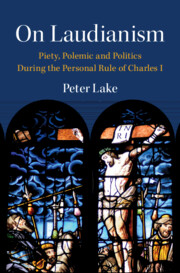Book contents
- On Laudianism
- Cambridge Studies in Early Modern British History
- On Laudianism
- Copyright page
- Contents
- Acknowledgements
- Abbreviations
- Introduction
- Part I Laudianism: Where It Came From
- Part II Laudianism: What It Was
- Part III Laudianism: What It Wasn’t
- Part IV Laudianism and Predestination
- Part V Laudianism as Coalition: The Constituent Parts
- Chapter 32 Dis-aggregating, or the Pleasures and Benefits of Splitting
- Chapter 33 Of Converts, Collaborators and Apostates
- Chapter 34 Of Converts, Collaborators and Apostates
- Chapter 35 Of Apparatchiks, Zealots and Coming Men
- Chapter 36 The Laudian Avant Garde
- Chapter 37 The Laudian Avant Garde
- Chapter 38 Tacking and Trimming
- Chapter 39 Conclusion to Part V
- Conclusion
- Index
Chapter 33 - Of Converts, Collaborators and Apostates
Puritans
from Part V - Laudianism as Coalition: The Constituent Parts
Published online by Cambridge University Press: 05 October 2023
- On Laudianism
- Cambridge Studies in Early Modern British History
- On Laudianism
- Copyright page
- Contents
- Acknowledgements
- Abbreviations
- Introduction
- Part I Laudianism: Where It Came From
- Part II Laudianism: What It Was
- Part III Laudianism: What It Wasn’t
- Part IV Laudianism and Predestination
- Part V Laudianism as Coalition: The Constituent Parts
- Chapter 32 Dis-aggregating, or the Pleasures and Benefits of Splitting
- Chapter 33 Of Converts, Collaborators and Apostates
- Chapter 34 Of Converts, Collaborators and Apostates
- Chapter 35 Of Apparatchiks, Zealots and Coming Men
- Chapter 36 The Laudian Avant Garde
- Chapter 37 The Laudian Avant Garde
- Chapter 38 Tacking and Trimming
- Chapter 39 Conclusion to Part V
- Conclusion
- Index
Summary
This chapter traces the careers of various erstwhile puritans, who, with varying degrees of enthusiasm and commitment, jumped on the Laudian bandwagon, or more politely converted to the Laudian way of seeing things. On the one hand, were those who, displaying the zeal of the convert, became more Laudian than Laud himself. Here the best examples are Foulke Robartes, John Yates and Samuel Hoard. Then, on the other hand, there are others who, far from going all-out, merely accommodated themselves to certain Laudian styles, values or modes of speech. Here the best example is Nehemiah Rogers, and the chapter features a relatively extended account of his career, connections and opinions.
- Type
- Chapter
- Information
- On LaudianismPiety, Polemic and Politics During the Personal Rule of Charles I, pp. 435 - 443Publisher: Cambridge University PressPrint publication year: 2023

